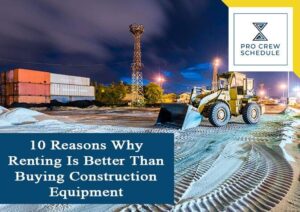When managing construction projects, equipment procurement is one of the biggest factors to keep in mind. There are three routes you can take: buying, leasing, or renting. While each has its advantages, we’ll look at why renting is the better option in this article.
For many, renting is the most viable option for equipment procurement. Among the many reasons its gaining popularity is the increasing cost of buying equipment and the unstable market. These lead to construction firms looking for ways to save money.
If you’re deciding on how you get your construction equipment, here are some benefits your company would get by renting.
Advantages Of Renting Construction Equipment
1. No upfront investment
Construction equipment, especially large machinery like excavators and dozers, is extremely expensive to purchase. Even if you buy second-hand, it can significantly impact your company budget and take a “good” year or two to make it back.
When you purchase something with a high capital cost, your money will be tied up until you are able to sell it. And if you’ve used it well for a long time, sale offers might be lower than desired.
On the other hand, renting construction equipment allows you to have a good deal of money freed up and not tied up in pieces of capital equipment. You can avoid upfront costs associated with purchasing, and that chunk of free budget can be allocated for other business opportunities.
2. Less maintenance and repair expenses
Purchased equipment requires resources for maintenance and repair, which are an additional cost. Despite it being “heavy” machinery, vehicles and other equipment need proper upkeeping to operate optimally and safely. So, if you’re considering buying your equipment, note that you’ll have to pay for repairs and maintenance costs as long as you own them.
Although rental equipment also needs maintenance and repair, the time and labor costs associated with repair and maintenance are significantly lower than that of purchased equipment. Plus, you won’t have to worry about it for the entirety of the machine’s lifecycle. Instead, you’ll only have to think about it for the duration of the project. Rather than spending time developing a long-term maintenance plan, you can focus on the near future with equipment rentals.
3. Avoid storage and transport costs.
People who decide on purchasing equipment have to think of short-term and long-term storage solutions, which are not cheap. As previously mentioned, construction equipment is expensive and needs proper maintenance– you can’t just leave them out in the open where they are vulnerable to damage. Prolonged exposure to the elements, like scorching heat, driving rains, and strong winds, as well as poorly ventilated spaces, can degrade machine quality.
You don’t have to worry about the logistics of storing and transporting the equipment from site to site. The rental company takes care of all that, and you can have it picked up and delivered when needed.
This setup allows you to respond to the different needs in different locations quicker. Through the coordination of putting the right piece of equipment in the right location at the right time significantly boosts efficiency. It can contribute to streamlining operations, shortening work days, and even save money.
However, organizing a system with such precision can be exhausting and confusing. So, project managers can use software that helps project management for construction. Programs like Pro Crew Schedule management software can help contractors and managers stay on track to ensure a smooth construction process.
4. Protection from market dips
As an industry, construction is dynamic and has many factors that influence the market. Some of which are out of your control, such as the rising and dipping of equipment costs and the number of jobs available.
Equipment rental sort of shields or cushions your company from unexpected financial/economic declines. Compared to committing to a piece of equipment, renting is a flexible alternative that makes it easier to handling market fluctuations.
5. Alleviate coordination worries
Equipment rental is a win-win cycle for businesses. The rental firm’s experts can provide maintenance services and figure out what’s wrong if there are any issues. They’ll also take care of the storage and transportation of the equipment. As a customer of their services, you don’t have to concern yourself with the organization of training, maintenance, and equipment scheduling. You’ll have more time and mental space for scheduling other construction details.
Basically, renting construction equipment contributes to stress reduction and time gain.
6. Reduce waiting and associated losses
Time is crucial on project sites, and managers agree that lost or wasted time eats into profit and messes up schedules. To see progress, you’ll have to look back on the baseline of a project. But there is no progress when waiting for a piece of equipment to arrive or be repaired, which is not suitable for business.
However, rental agreements allow for on-demand delivery and pickup for the exact time the equipment is needed. If you need a bulldozer for five days, it can arrive when you need to start and be picked up when you’re done with it.
This also ties in with storage space. When a piece of equipment is done being used, it can just be picked up, letting up room for other equipment or tasks.
More than that, experts maintain and service the equipment. This means that it’s less likely to fail or malfunction when used, not wasting time while an alternative is being found and transported.
7. Sharpen edge against the competition
Construction is a cut-throat industry with fierce competition. Of course, big companies have the advantage because they have the means to purchase the newest and nicest machines.
But equipment rental gives chances to small businesses. They are able to get a hold of the same new and nice equipment without having to pay for them in full, sharpening their competitive edge.
If you’re a small construction firm and a client asks what equipment you use, you can confidently say that you can access diverse, efficient, and state-of-the-art machinery.
Disadvantages Of Renting Construction Equipment
Renting is indeed a good option for equipment acquirement. However, in some cases, buying or leasing is the better choice as there are a few drawbacks to equipment rental.
8. High total cost for long-term rentals
Parallel to paying for what you use as an advantage, it can also be a drawback. The total cost of rental equipment would depend on how long you would be renting it. If you rent a piece of equipment for a long time, the total cost might be larger than the equipment’s actual price. So, it might be a cheaper choice to buy it if you see that it will be in use for a while. Renting is better for smaller projects.
9. No return of investment
An advantage purchasing equipment has over renting is it gives at least part of your investment back. If you keep the equipment you bought in good shape, there’s a high possibility of you selling it and gaining some of your investment back. But with renting equipment, you won’t be able to sell it because you don’t own it.
10. Availability
With a rental agreement, waiting time is eliminated as delivery and pickup are on-demand. But that does not eliminate the possibility of the needed equipment being unavailable.
While rental companies occasionally update their inventory, they don’t have all the equipment models, brands, and kinds. Sometimes, you’ll be forced to settle for another model available. You can wait for the equipment to be available, but that will throw the construction schedule off, causing more problems.
If you choose to rent, you better be prepared with alternatives in case the one you had in mind falls through.
How To Know If You Should Buy Or Buy Construction Equipment
Equipment procurement is a big component in the construction process and renting and buying have their benefits and drawbacks. Before signing a rental agreement or committing to a piece of equipment, there are a few things to consider.
a. Scope of business and duration of equipment usage
Before anything else, determine your business’s scope and how often/long the equipment would be in use. If it’s just for a specific project that may not have a lot of use beyond that, then renting is the better choice. On the other hand, if you see that it will be used frequently, then maybe consider purchasing it.
If you’re thinking of buying equipment but are on a tight budget, you can look into second-hand equipment.
b. Current financial situation
It’s crucial that you consider your current financial situation. Purchasing equipment has a higher initial cost added to ongoing expenses like storage, maintenance, and insurance. A lot of those worries are covered when renting.
But it’s essential to look at your current financial abilities and see how it will look like in the future. Both renting and buying have long-term impacts.
If you are a contractor looking for effective subcontractor scheduling software, use Pro Crew Schedule’s Software. Sign up today and get a free 30-day trial with all its features and no strings attached. Request a demo today!







